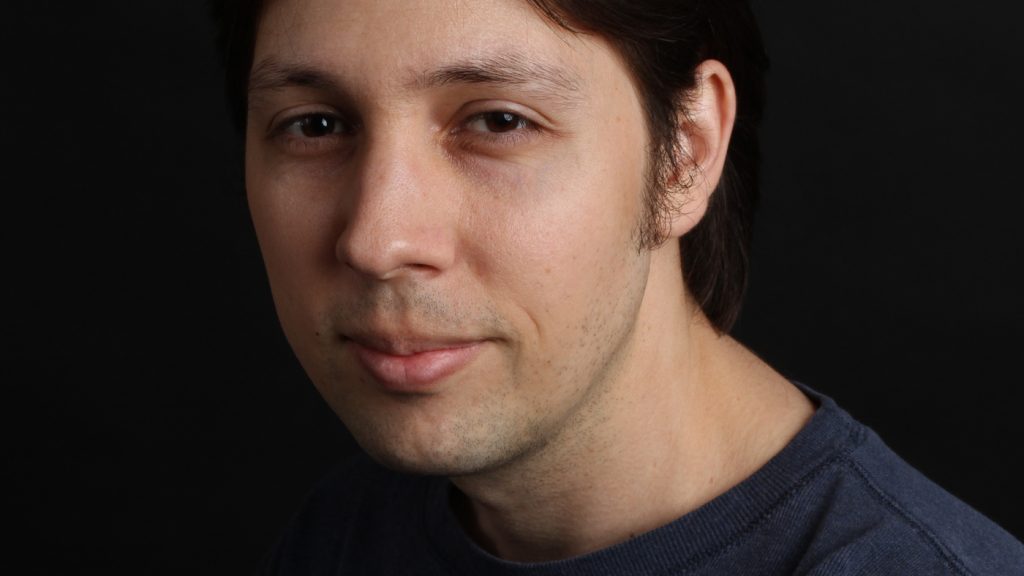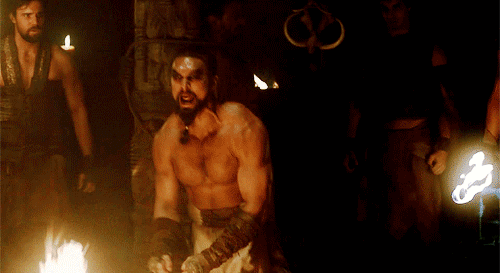
Tonight, Game of Thrones language expert David J. Peterson will join the podcast! David has created languages for HBO’s Game of Thrones, Syfy’s Defiance, Syfy’s Dominion, the CW’s Star-Crossed, the CW’s The 100, Showtime’s Penny Dreadful, MTV’s The Shannara Chronicles, NBC’s Emerald City, and Marvel’s Thor: The Dark World. Davis is the author of Living Language Dothraki and Penguin Book’s The Art of Language Invention.
We’re excited to welcome David back to show! We’ll be catching up ahead of his appearance at Con of Thrones, and discussing what we can of season 7. Beyond that, the news of spinoffs have set the community ablaze, and we’d like to ask David more about the languages he’s created that haven’t made it to the series. Could this shed some light on what’s the come, or was Wun-Wun really a cruel joke? (h/t to the History of Westeros podcast)
Obviously there’s more to get into. Do you have any questions for David J. Peterson?
Let us know in the comments!

Did Kinvara have any Valyrian to speak in season 6 , that was cut?
What an impressive resume!
My question: Out of all the shows and movies you’ve worked on, which language was the most difficult to create? What was challenging about that language?
Hi David! Can we look forward to any new or surprising languages in season 7? Were there any significant expansions on Dothraki or Valyrian for the new season?
1 – What are all of the languages from GRRM’s world that you’ve developed so far, as a list? I saw you remark once that you actually worked out Lhazareen already (did that result in Lhazareen-accented Dothraki or something to the Lhazareen Khaleesi Dany meets in Season 6?)
2 – I’m intrigued by how you developed accents for fictional languages; i.e. Dothraki-accented English/Common Tongue, based on what sounds exist in English that don’t in Dothraki. Can you give some more details/examples of this?
3 – In prequel series across coming years, we’ll probably see characters from the Free Cities – either as foreign merchants, or particularly in a Dance of the Dragons prequel I guess (the northern ones side with Rhaenyra, the southern ones with Aegon II).
Do you hope to ever actually develop Low Valyrian language variants for all nine Free Cities? “Not so much one language as nine dialects well on their way to being separate languages” etc.
OR, would you perhaps simplify this to develop the major sub-branches only? That is, if the Ghiscari Low Valyrian we saw in GOT was “East Low Valyrian” (and generally intelligible between the three variants we heard of that), you’d at least make a generalized “Northern Low Valyrian” and “Southern Low Valyrian”? So if we get characters from Myr they’d speak souther, from Braavos would speak northern? With slight “accent” differences between them? (not nine full languages for TV version)
4 – We’ve asked why the actors don’t speak Low Valyrian in Braavos; or, I guess they do but it’s universally translated for the sake of the viewer. What was the discussion like this behind the scenes? I mean did you ever ask “Braavos should have Arya speaking Valyrian?” or did this not come up?
5 – I saw in the past when you talked about Old Tongue in Season 6 that you said “Mag Nuk” was the giants’ sub-dialect, and one of six sub-dialects….matching up with something Clapton said that the wildlings as a whole had six sub-types defined by costume.
This seems to imply that behind the scenes the wildlings are officially defined into six sub-groups in the TV show, but we never got confirmation on what they were:
I…assumed, they were:
1 – main group, from the Haunted Forest, like Ygritte and Tormund.
2 – Frozen Shore people, like Karsi
3 – Hornfoots from the mountains, like the Lord of Bones
4 – Cave People
5 – Thenns
6 – Giants.
Hope we see more of the Old Tongue when Duncan goes north and faces Raymun Redbeard….
6 – Prequel series recently announced; this raises the question about linguistic change over time. I saw you mention something before about a rule of how long it takes even the accent of another language to wear off; i.e. the Targaryens originally spoke Valyrian but switched to speaking Common Tongue. So if we have prequels in say the Targaryen Conquest/Sons of the Dragon era, or even the Dance of the Dragons, at what point would they stop speaking Valyrian?
7 – Off the top of your head, what major features would Valyrian-accented English sound like? (just a few broad things, i.e. Classical Latin pronounces its V’s as W’s and doesn’t have a “W” sound, the Valyrian version of that; what sounds does English have that it does not?)
Is Mr. Peterson acquainted with Anthony Burgess’ creation of the Ulam language for the the 1981 film “Quest for Fire,” and if so was he influenced at all by Burgess’ work on that “caveman epic”?
Looking forward to the podcast!
Was Khal Drogo elite?
8 – No spoilers, just pure speculation knowing what historical eras already exist in Westeros like Dunk & Egg or Dance of the Dragons: what’s your personal wishlist for other languages you hope to introduce in prequels that could PLAUSIBLY be featured in them? I.e. I doubt we’d hear Lhazareen in a Dunk & Egg prequel set in Westeros, but they mention Summer Islander language a couple of times in the books, and there are Summer Islander traders in every port city, so they could plausibly show up in any prequel.
9 – Why doesn’t Duncan the Tall recognize that Egg isn’t really a squire but must be a highborn – given that he probably had a highborn accent? TV-Gendry and Tywin could tell Arya was a highborn from her accent.
Which does Mr. Peterson imagine would be harder to learn, Dothraki or Klingon?
No, let me rephrase that: which would he imagine is dorkier to learn, Dothraki or Klingon?
[Just a little levity, fellow Trekkers. 😉 ]
I would guess that Klingon is harder to learn – given that it was *intentionally* made difficult, intentionally using rare constructions to make it sound “alien”.
Might as well also submit this for the sake of asking: any news on Living Language Valyrian?
The Dragon Demands,
JIchegh lugh vIHtaHbogh ‘e’, Dragon, je Heghlu’meH QaQ jajvam!
(Loose translation: You are probably correct about that, Dragon, and today is a good day to die!) 😉
Hi David, in the real world, which language has had the biggest impact on your creative process/thinking? 2nd part to that question, in the world of GOT, which real world language have you borrowed most heavily from? Gracias
how do you say
in Dothraki?
Since we’re talking Spin-offs…
Hello David! Do you have any particular language sounds/bases that you haven’t yet explored much on GoT that you’d love to use in a spin-off GoT language? Something for Summer Islanders, Giants, etc…
Ack: I meant to say “stop speaking WITH a Valyrian ACCENT.
I heard someone mention a rule once that it takes 3 generations or something.
David, which was the season in which you had most lines to translate, and which one the least? Does the story leaving Essos behind mean season seven will suffer a significant drop-off in Valyrian and Dothraki dialogue, or will Dany’s retinue keep these languages alive in the coming season? How much Valyrian and Dothraki will there be, compared to previous seasons?
I was always curious about this! Yes, from which language/s did he draw inspiration for lilt or tonality/inflictions of Dothraki and Valyrian? I suppose he must have gave this answer before but I didn’t happen to read it or hear about it.
Also, is he developing any languages for now for the any possible spin-offs? I’m not sure he’s allowed to say it even if he does. But I read somewhere that he developed Dothraki well in advance of the show being made so…
Can you talk about the Skroth language you had originally created for the White Walkers before the pilot?
David,
This is a really, really simple question, following up on Old Nan’s Pie question about which language(s) have influenced you most in the creative process.
Did you grow up speaking more than one language? And if yes, which language(s)? I ask because I grew up bilingual (English/Portuguese), began learning a third language at 8 or 9 (Spanish), and as an adult have repeatedly found that people raised with more than one “mother tongue” have a fundamentally different view of language (and sometimes, even time, inanimate objects, and the living world!) than people raised monolingual.
Wolfish,
yes, I’d love to know this as well. I would think that someone who invents languages would have several languages under their belt. But perhaps not?
Hi David!
How can I get an internship with someone like you?
Laurence
In downtime, I’ve tried to learn Dothraki and High Valyrian from apps on the web. Japanese is easier.
Will he do a Living Language for High Valyrian?
The Dragon Demands,
Ha! I asked the same thing!
Catspaw Assassin,
How weird I was just thinking about that movie. Great wasn’t it?